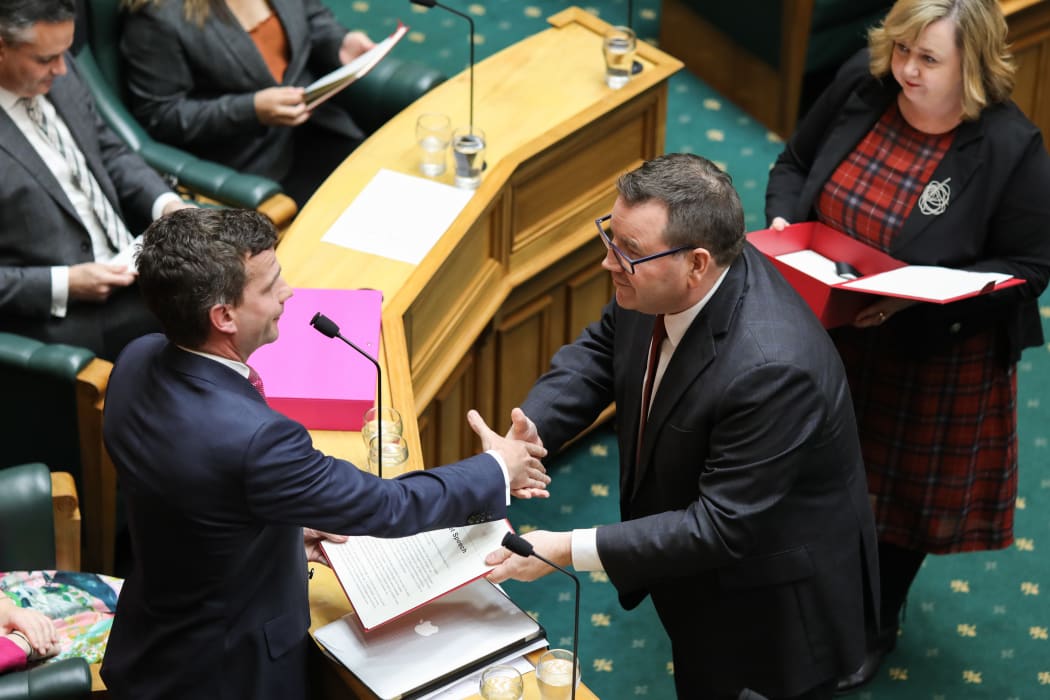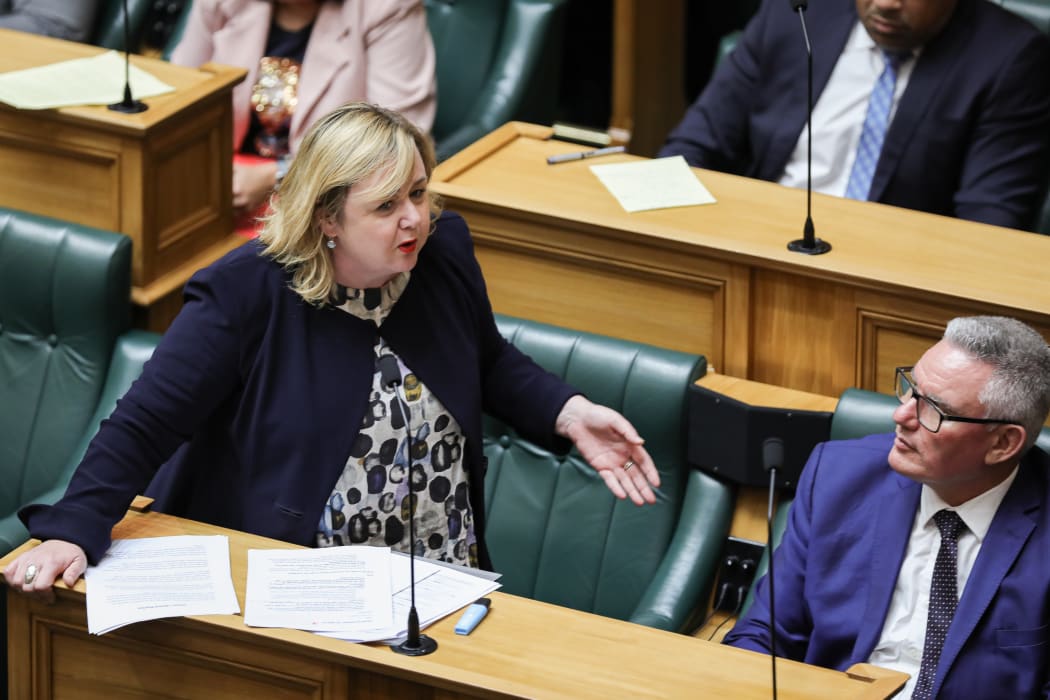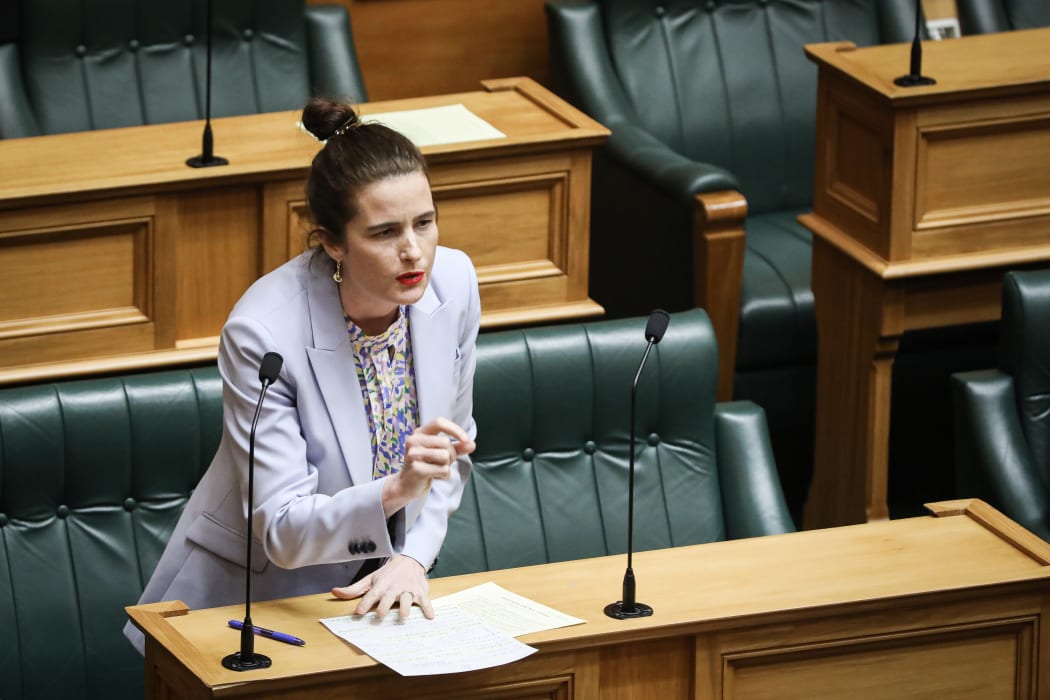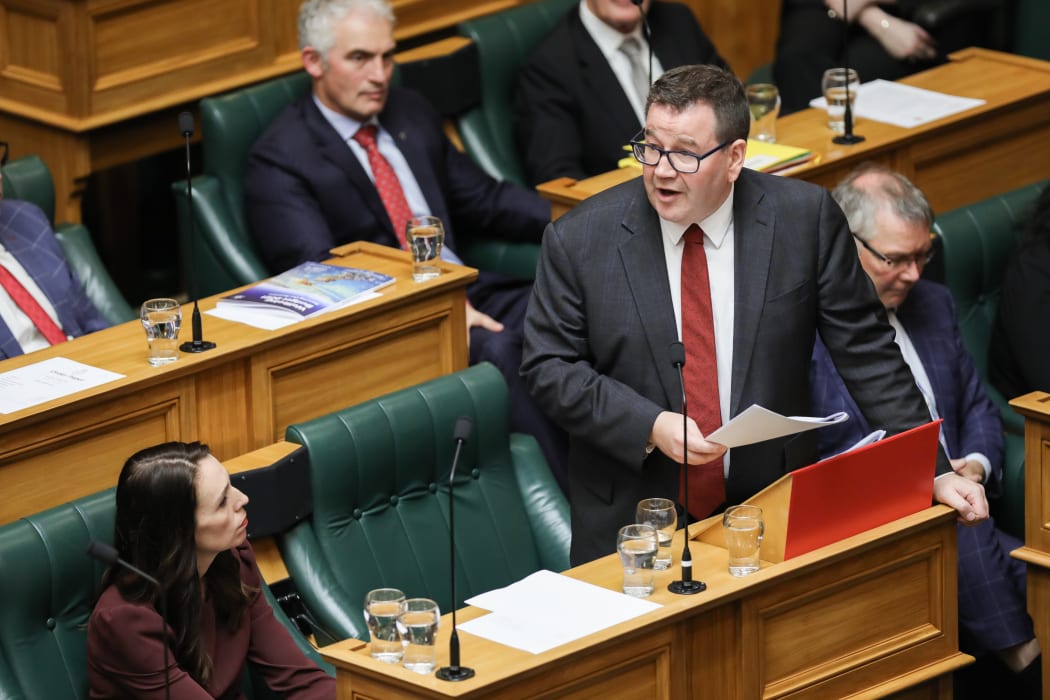Eight hours of debate on Budget 2021 has wrapped up at Parliament with MPs praising and criticising the government's spending plan.

Grant Robertson gives a copy of the budget speech to David Seymour Photo: ©VNP / Phil Smith
The Budget Debate is the second reading of the budget bill (Appropriation (2021/22 Estimates) Bill) and the most well-known part of it is the Minister of Finance's statement revealing how the government intends to spend the country's money for the next financial year.
Most speeches in the House are between five and 10 minutes long but Budget statements often stretch out to about 40 minutes. While most of the statement is about revealing the number of dollars that particular areas will get (like health, housing, Covid-19 etc) the minister will often give an overview of the country's economic state and where it's predicted to go.
Once they have delivered their statement other party leaders get a chance to respond (20 minutes for those with more than six MPs, 10 minutes for those with fewer). This part of the Budget Debate is normally wrapped up in a few hours after which interest from the media and the public tends to wane.
But eight hours in total is set aside in the House for MPs to debate Budget 2021 and at the start of June, there was six and a half hours left to go.
The debate used to be longer at 15 hours but the Leader of the House Chris Hipkins said MPs decided some of that time could be better used elsewhere.
“We made the decision in the last Parliament to reduce the length of the Budget Debate because it was becoming a little bit of a cliche, a little bit repetitive, a little bit formulaic, and so making it shorter and sharper means Parliament can focus on other issues. The time that previously would've gone into that extra-long debate now goes into debating other issues including select committee report backs and so on."
Hipkins said the Budget Debate gives ministers an opportunity to highlight what they are pleased about, and opposition MPs the chance to say what they think should have been included.
Essentially the debate boils down to 'Budget good' or 'Budget bad' with MPs picking out parts of the Budget that relate to their areas of expertise or interest.

Labour MP Megan Woods in the House Photo: ©VNP / Phil Smith
Minister of Housing Megan Woods used part of her speech to acknowledge the work done on Budget 2021 by the Minister of Finance and how the Budget outlines the government's investment priorities.
"We are investing in our people. We are investing in infrastructure, and we are tackling those long-term issues like inequality, housing, and climate change. These are all issues that need to be addressed," Woods said.
Housing was a major part of Woods' speech with mention of $3.8 billion in funding for a housing acceleration fund which was announced in March.
"This will enable us to maximise the potential of the land that we own to get more pace and more scale into those large-scale projects. It will also allow us to work with councils, it will allow us to work with iwi, and it will allow us to work with Māori to ensure that we are setting up more land for development and that we are finally doing something to address affordability in our housing market."
It's typical for MPs in the governing party to speak positively about the Budget with the other side of the House taking the more critical approach.

National MP Nicola Willis Photo: ©VNP / Phil Smith
The National Party's housing spokesperson, Nicola Willis, said the government had failed to deliver on housing.
"They promised New Zealand 100,000 KiwiBuild houses and Damien O'Connor says, 'It's because you sold houses.' Well, is he aware that his government has sold hundreds of houses, has demolished hundreds of houses in the same policy that has continued?
"Actually, this is about a failure. The problem is that they are prepared to tolerate it into the future. They have no plan to turn it around. They have no plan to change it. They're simply going to put up with it."
The ACT Party's deputy leader, Brooke van Velden, also had critical words for the government's housing policies.
"Wellington's average house price is now over $1 million, Auckland's average house price is over $1.25m, and the prices continue to rise. They're rising across the whole country and it's increasing the costs of rents, mortgages, and all living costs for all New Zealanders," she said.
"The problem is actually quite simple, though. We're just not building enough homes. But the government's response in this Budget has been to dither and divide. They've announced billions for housing infrastructure, but they don't have a single detail to support it."

Grant Robertson gives the Budget speech Photo: ©VNP / Phil Smith
The final word of the debate goes back to the Minister of Finance, Grant Robertson, who responds to some of the criticisms and reinforces the good points of his Budget.
"This is a Budget that secures our recovery. This is a Budget that gets the balance right, between making sure we invest where it is needed most while being responsible and careful with the financial management of our country," he said.
"It is a Budget that starts to get on top of our long-term issues around inequality in our society, around making sure everybody has a warm, dry, safe home to live in, and looks to the future of a low-emissions economy that will produce high-paying jobs. It is a Budget I am immensely proud to have delivered in this House."
At the end of the debate, a vote is held on whether to agree to an alternative motion put forward by the Leader of the opposition which removes confidence in the government.
The motion reads as: "this House has no confidence in anything this government promises, because after just four years its track record of failing to deliver, of broken promises, of spin over substance, and of announcements over results, speaks for itself."
It is not agreed to which is unsurprising as the government has the majority support in the House and the Budget bill passed its second reading.
The next step is the estimates hearings which involve ministers appearing before select committees (groups of MPs from different parties which focus on particular areas like health, justice or education). Ministers have already started appearing before committees and the schedule of their public appearances can be found here.


